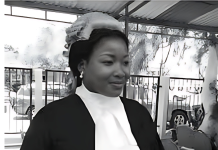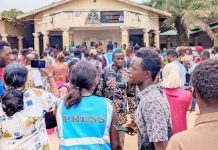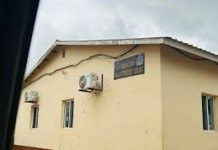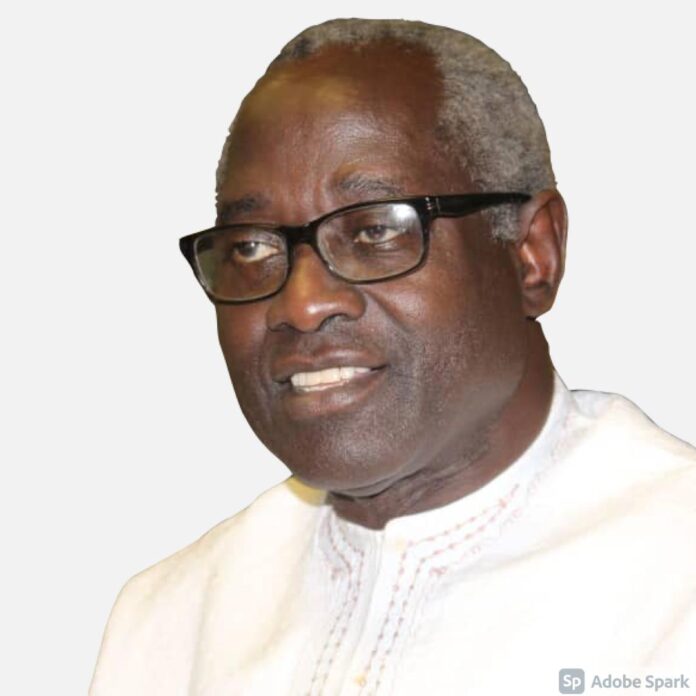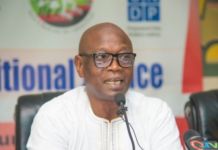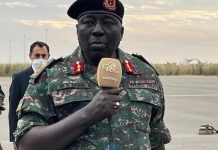When a debate starts to sound like a broken record common sense teaches that there is greater merit in drawing the curtain and exiting the stage instead of prolonging the theatrics. To prolong an unconstructive conversation would only serve the person who has a lot of time in his or her hands to waste. Those who are interested in an enriching and constructive conversation that could stimulate the horizon of their minds would rather fan back from a tragicomical situation where a person’s sole motive, in a debate, like shylock of the Shakespearian play, is to have a pound of a person’s or party’s flesh just to diminish a historically and deservedly earned stature into electoral irrelevance, even though those same persons and party are, at this very moment, being called upon by the many to lead the way to build the political clout of the opposition. Many discerning readers would prefer to wait for those who are interested in seriously meant discussions on constitution making or building and national development to take centre stage in the Amphitheatre of the nation so as to give the people sufficient reason, justification and motivation to resume their seats.
A person like Dr Jannah who to my great disappointment is proving not to have anything more to add to a national debate on how to save the Gambia but to serve as the self-appointed prosecutor, judge and jury of Gambian politics, who is not hesitant in shifting the goal post of a conversation to maliciously attack a political party, as one holding brief for opponents, that have no regard for electoral code of conduct would do, just to cover unpleasant facts with angry invectives, even though he claims to be a non-partisan standard bearer, should be left to have his own isolated platform to vent his venom. He is now free to speak and act as the self-appointed spokesperson of an imaginary anti-PDOIS camp that is rooted in the figment of his own grey matter, that is claiming to be speaking for the youth of the Gambia, even though they belong to the generation of the executive that misruled the Gambia for 22 years. They will continue to earn their just deserts.
Unlike Dr Janneh, who invites all the adjectives, superlatives, adverbs, verbose jargons and poetic cliches he could muster to feign intellectual profundity without quoting the concrete views I express and advance rebuttals that are convincing to those who are capable of discerning, understanding and accepting truth when they see it, I will continue to draw attention to his misguided allusions and illusions and render illuminating clarification to expose his demonstrated political bad faith and how he is descending down the slippery path of political illiteracy.
The readers would recall that Dr Janneh started by paying homage to what he conceived to be my legacy and advised with unparallel vehemence that it should be preserved without any blemish. He seemingly claimed that he has benefitted from my wise counsel during his formative years and then went on to draw lessons from a Mugabe scenario that had no bearing to my situation. It did not take long for him to start spitting in the well he claims to have drunk from as is common to all those who have the ulterior motive of playing to the gallery by first stooping to feign humility only to find ground to rise up to demonstrate their ambition of conquest of a particular standing in society by situating themselves close to people they regard as icons.
Now it should be clear to all Gambians that not all those who praise me share my convictions. In fact, some use sugar-coated bullets to cover up their life long attempt to dissuade people from supporting PDOIS by peddling half-truths about the party and its leaders with such unremitting thoroughness that an uphill battle had to be faced in clearing the thick bush of misinformation and misrepresentation before getting to where we are today as custodian of the legacy of being the party that has enabled the country to know what sovereign nationhood and sovereign citizenship mean not only in words but in deeds, by rejecting Ministerial offers of coup makers and paving the way for a coalition that brought change through the ballot box for the first time in Gambia history, without deriving any benefit from the policy of the sharing of the cake that followed. We remain true to this day to the policy of saving the Gambia, which motivated us in participating in coalition building, as an instrument of promoting national cohesion in order to give the country a new start in nation building.
PDOIS has been most consistent in not taking any short cut to political leadership by not ever trying to take power or sharing power taken at the back of the people but has instead stayed the course to seek to lead based on the enlightened and unalloyed consent of the people. It is obvious to the politically literate that Africa is conquered because of the conquest of the minds and will of our people due to parochial loyalties to ethnolinguistic origins, religious and other prejudicial sentiments, as well as, intimidation and patronage. Africa could only be free if the minds and will of our people are free to elect governments that exist for them and not one that make them to exist only to pay tax to sustain the privileges of rulers. It has always been our conviction that once the people develop the maturity to elect governments based on enlightened and unalloyed consent the more impossible it would be for tyranny and corruption to raise their ugly heads without being booted out and uprooted for good.
PDOIS has therefore been doing all it could to promote the knowledge and values of sovereign nationhood and sovereign citizenship with the hope that sooner or later, experience and awareness will reach a level where the people would give their enlightened and unalloyed consent to a party that is capable of leading them to build a freer, fairer and better society and more prosperous country. One would have thought that the self–abnegation that guides mind, might, will and heart through decades of hard work to liberate the minds of a people from stooping to conquest would be seen as an exemplary and virtuous political conduct of a life time and not a curse that drives a party into the abyss of electoral irrelevance.
Notwithstanding, PDOIS did not just continue to be preachers of higher ideals in democratic governance and sustainable development, it has recognised the politics of transition and coalition building, that even evoked, the first change of government through the ballot box. It provided guidance on how to build an expert bank to enable a new government to embrace and implement policies that would have led the country into taking quantitative steps towards the qualitative goal of building a freer, fairer, better and more prosperous, poverty free and right based society that would no longer be classified among the least developed or heavily indebted poor countries of the world.
This is why PDOIS became a part of the National Alliance for Democracy and Development from 2005 up to the 2011 elections when it pioneered the United Front and stepped out of the presidential race only to eventually pioneer the negotiation that ultimately led to the establishment of Coalition 2016. This confirms that PDOIS has been consistent in being part of the solution to Gambia’s democratisation and development challenges that has inspired electoral confidence based on context. That should be the invariable conclusion that any honest critic should come to. That is the incontrovertible and irrevocable truth.
That is not how Doctor, prosecutor, judge and jury Jannah sees it. The following shows how he conceives PDOIS:
“Despite its long history, PDOIS has never secured executive power at the national level. This raises not only strategic questions but also popular legitimacy concerns. Perhaps the issue is not that the people have failed to understand ideology, but that ideology has failed to understand the people’s urgent needs. If, after 30 years, a political party still cannot inspire electoral confidence, it must rethink its platform, not repeat it louder,”
Dr Janneh’s indictment of PDOIS is instructive. Its debunking with overwhelming thoroughness would prove that there is no correlation between high sounding academic appellations and political literacy. We came to gather this fact at the inception of implementing PDOIS’ approach to politics characterised by research and throwing light on the content of the 1965 and 1970 Constitutions. It became clear that more than 99.9 percent of all literate Gambians including, those holding the highest offices in the land, had never seen or read the content of these supreme laws. In fact, some of the largest categories of political illiterates could be found among people with the highest academic qualifications who also often become the worst peddlers of half-truths and misinformation that rob innocent minds of clarity of vision and purpose of mission. Who on earth who truly understands what PDOIS advocates for could have the moral conviction and audacity to call for such a platform to be abandoned for the sake of political expediency?
Two questions need to be posed to expose Dr Janneh’s political illiteracy. First and foremost, is Dr Janneh saying that the PPP ruled the Gambia for twenty-nine years and the APRC for 22 years because people understood their ideologies and by extension that those ideologies inspired electoral confidence? This is the first question.
Secondly, if the ideologies of the PPP and APRC inspired electoral confidence to enable them to secure executive power for 29 and 22 years respectively why are those ideologies not able to earn them executive power under current circumstances?
We can equally ask: If PDOIS’ so-called ideology had deprived it of electoral confidence and executive power then is Dr Janneh equally saying that the NCP, GPP, UDP, NRP, GDC and all other parties of the first and second Republics that never assumed executive power also have failed ideologies?
Hence, one must therefore conclude and take leave of this topic by emphasising that if all political parties are branded and classified into ideological camps and subjected to the litmus test of assumption of executive power as the only way of demonstrating electoral relevance, failing which the party should abandon its ideology, then only the NPP has electoral relevance in the Gambia, at this very moment and all other parties should abandon their ideologies. Only a mind that is devoid of clarity on the content and context of the electoral system in the Gambia would have an opaque barometer that would lead to such a myopic conception and conclusion on electoral relevance and the validity of political platforms.
The politically literate mind would first conclude that executive power belongs to no party or person. It is entrusted by the people. 2016 had demonstrated that executive power could shift at the most unexpected of times. What makes a political system relevant is to have the element of choice. Consent is inconceivable without the availability of choice. Electoral victory is not attained once and for all. It is periodically determined. A viable party is defined by law. Section 103A of the Elections Act (as amended) states:
“Subject to the provisions of this Part, political parties may be established to –
- participate in the shaping of the political will of the people;
- disseminate information of political ideas and on political, economic and social programmes of national character; and
- sponsor candidates for public elections.”
PDOIS has its Manifesto and is sharing its political, economic and social programmes with the Gambian people. It has been sponsoring and will continue to sponsor candidates as a political party should. PDOIS’ platform is unique to the party and offers Gambia a distinct option to enable them to have a choice. Herein lies its electoral relevance. It goes without saying that the platform and candidates PDOIS offers are its own making based on its own sovereign decision. Its electoral relevance should be judged by the quality of its programmes and the suitability of the candidates it puts up. Hence anyone who wishes to prove that PDOIS does not merit electoral relevance must be able to prove that the quality of its programmes and capacity of its candidate in any contest for the presidency are below standard.
On the other hand, how people vote is entirely their own making and volition. The electoral relevance of the people should be determined by the quality of leaders they select and the quality of services they deliver after election.
Hence a truly politically literate citizen should know that electoral relevance has two components and two major determinants. It has the component of the parties with their programmes and candidates whose viability and relevance must be assessed and graded, on one hand, and on the other hand, the component of the electorate who may or may not vote on the basis of the quality of programmes and the suitability of the candidates that parties may put up. The quality and relevance of their decision on party programmes and candidature in their selection process could also be assessed.
It suffices to conclude this portion by asserting without any equivocation that any politically literate Gambian could not ignore the obvious fact that political parties of the first and second Republics that had ever won through the ballot box relied more on the ethnolinguistic mindset of the people, intimidation, by even threatening communities of deprivation of development projects and political patronage to win elections and occupy executive office. They do not instead rely on a body of ideas or programmes that their members subscribe to and disseminate, aimed at winning the hearts and minds of the electorate.
Hence the use of the term ideology is grossly misplaced in the Gambian context. Only a politically illiterate person would argue that voters in the Gambia are casting their ballots on the basis of ideology. Hence to ask PDOIS to abandon its platform is not only preposterous it also diminishes the seriousness that one should devote to a debate with a self-proclaimed seasoned technocrat. One may look at the sun and say it is the moon and deem himself infallible for doing so. When a position is taken that is obviously ridiculous no room is left for a constructive conversation. This is how matters stand on this score. Let us more to the second point.
Dr JANNEH WROTE:
“PDOIS and the Fallacy of a Hidden Succession
“Uncle Halifa Sallah claims that PDOIS has capable leaders in waiting. However, no formal framework for succession has ever been made public. No known mechanisms exist for party renewal, open primaries, or generational integration. If PDOIS has nurtured ‘leaders,’ then why haven’t they been given platforms to speak, lead, and challenge? In contrast, countries like South Africa, Ghana, and Botswana ensure visible succession transitions within parties. In governance, what remains hidden cannot inspire public trust. If PDOIS has trained successors, where are they? Who has been publicly nominated as a 2026 presidential contender? Where are the youth voices at the forefront of PDOIS strategy? Other African parties, such as Senegal’s PASTEF, Ghana’s NDC, and South Africa’s ANC, have shown visible succession planning and generational leadership pipelines. A political party that cannot name or elevate its next generation leaders is either unwilling or unable to relinquish its legacy monopoly.”
MY RESPONSE:
Dr Janneh promised us that his response “aims to clarify, educate, and provide all Gambians, whether youth, elders, or diaspora, with the tools to distinguish between tested as public policy and poetic ideology.”
It is not out of place to indicate that clarity and education must be rooted in facts and factors and not on fiction and figment of imagination. Science provides tools to conduct literature reviews to gather prima facie evidence from constitutions of political parties or conduct interviews and focus group discussions to gather facts on political party conduct before making generalisation.
His outrageous remarks that no mechanism exists in PDOIS for open primaries is not only fallacious but is grounded on deep seated disregard of any attempt to conduct any research on what makes PDOIS a leading party in ensuring grassroots party participation in determining candidature at all levels of state political representation. Let me first quote what the PDOIS Constitution says about primaries:
Chapter Twenty -Two, Article 91 of the PDOIS Constitution deals with elections and reads as follows:
“Presidential candidate will be chosen through primaries held in each administrative area. The person who receives the highest number of votes cast by the members in the various administrative areas will be the Party’s presidential candidate.
Candidates for National Assembly elections will be determined by the members in each constituency in consultation with members of the Central Committee.”
As recent as the last National Assembly and Council elections held in 2022 and 2023, respectively, candidates had to depend on primaries to be selected by the members of the party in the respective Constituencies and wards.
How can anybody who is familiar with PDOIS party Constitution and the political conduct it faithfully engenders fail to notice the numerous primates held to determine candidature whenever the members at each level deem it fit, claim that there is no known mechanism for open primaries in PDOIS?
The facts borne out the concrete text of the PDOIS Constitution and concrete practice of the party confirms that Dr Janneh has not made the type of effort that is expected of a high-grade thinker with good faith to familiarise himself with the PDOIS Constitution or its practice in determining candidature to know the truth, the whole truth, before passing judgment on PDOIS. He is therefore guilty of miscarriage of justice for not having any interest in investigating to know the truth in good faith before passing his judgment. He is therefore not fit to occupy the judgment seat of reason and justice to deliver quality judgment on PDOIS’ rules and practice in determining candidature for public elections in the Gambia. He has woefully failed to display any inkling of an aim to clarify and educate but has amply shown unmasked intention to distort the truth and alloy it with fallacies just to muddle the waters and miseducate the youth, the elders and the diaspora he has promised to enlighten. His actions can earn him no honour or integrity. He is urged to repent to reclaim his honour and integrity, otherwise he would end up in the camp of political charlatans who daily engage in endless quackery to feign intellectual profundity. Such dishonest critics of PDOIS have been its major obstacle, compelling very knowledgeable members of the party to spend their precious time to clarify issues instead of devoting such energy to promote the transformation of mindset for nation building.
It goes without saying that a party like PDOIS that has embraced the values of the Republic, has a democratic mechanism for succession and not a monarchical one. Any member who has all the qualifications required by the Constitution of the Gambia and the electoral laws may be a Candidate for the office of President, National Assembly member, Chairperson of an Area Council or Mayor or Mayoress of a Municipality irrespective of whether one holds a position in the Central Committee of the party or not, if one is nominated and voted for by other members of the party. What lesson could PDOIS learn from any other party in the world regarding democratic selection of its candidates for councils, the national Assembly and the Presidency by its members in wards, constituencies, municipalities and regions?
It is therefore unalloyed fallacy for Dr Janneh to assert that “no formal framework for succession has ever been made public; that no known mechanisms exist for party renewal, open primaries, or generational integration.”
People of all generations had joined the party and became candidates by relying on the support of the members without any bureaucratic or hierarchical obstacles derived from power play. It is also ridiculous for Dr Janneh to ask for a list to be presented to him of PDOIS potential candidates. If people, who have every right to indicate their willingness to be PDOIS presidential candidate choose not to go public with their convictions, does that not show humility and temperance in the pursuit of public office as a duty to be shouldered when placed upon one’s shoulders by one’s peers rather than a prize to be sought, fought for and won at all cost?
Let me take this opportunity to explain to Dr Janneh that PDOIS’ political culture is that of the sovereign Republic and the sovereign people. That political culture demands that programmes come before personalities and personal ambitions. Hence the duty of all PDOIS members is to promote the programmes of the party and those who could do so the best would be the most visible in doing so in between elections. However, when it is time to put up candidates the members would choose those best placed to win those elections, irrespective of visibility in the battle of ideas to convince the people that the party has the answers to the challenges of the day.
Only those who prepare themselves in carrying the burden of utilising mind, might, heart and will to explain and defend those programmes that would safeguard the interest of the sovereign Republic and her sovereign citizens, and do not hesitate to show how all the resources of the country could be harnessed and utilised to build national unity, liberty, dignity and prosperity for all and not just a privileged few would be fit to take the political stage on behalf of PDOIS, irrespective of age, and promote its vision and mission from sun up to sun down, as frequently and vigorously as they could. In performing this duty PDOIS members are not engaged in a contest for cheap popularity or restrained by authoritarian or patriarchal chains.
In fact, the main resolution from the 2023 Congress and the Central Committee meetings that followed is to build PDOIS into a grassroots member-based party that transforms all its members into depositories of its message and challenges all of them to become messengers in spreading it in every nook and cranny of the country, the continent and the world. No PDOIS person is prevented from being visible. Hence if some had not occupied the public stage it should be seen to be due more out of humility and disdain for cheap popularity than any other allusion.
In a party where those who hold the fort display virtuousness and competence few people would have interest in duplicating efforts. History has made Dr Janneh to strike the right chord in calling on all PDOIS members to stand and be counted if they are really there. The multitude of quality members would soon stampede into the public space and to make him to hide in shame for trying to turn facts into fallacy.
Those who have been more visible than all the other PDOIS members are just the front runners of a party that had to start from scratch to do the painstaking work of transforming each Gambian voter into an enlightened sovereign citizen who could cooperate with each other to become the architects of their destiny under a sovereign Republic that would guarantee their right of ownership of and to derive benefit from its natural and mineral resources and sovereign wealth. It is obvious that as more people take ownership of the message more messengers would become visible in the public space to spread the message.
PDOIS’ method towards executive office has of course been a protracted one because of the realisation that it could only attain results that are different from those derived from regime changes in other parts of the continent, if it refrains from putting the cart before the horse. Hence the frontrunners have been performing the duty that all PDOIS members must perform before talking about selecting candidates from among our numbers, that is, to build national consensus on the existential threats facing the nation and proffer convincing solutions that would change the system for a freer, fairer and better Gambia, where government exists for all sovereign citizens and not allow the backs of such owners of the country to be scraped just to maintain the privileges of government.
PDOIS has been convinced from the inception that unless the sovereignty of the people is entrenched, democracy and development cannot be fully assured and sustainable. We the frontrunners of the PDOIS agenda for system change have always had the conviction that Africa could only be a frontrunner or among the frontrunners in world politics if the sovereignty of the people is entrenched in even one country to ensure that power and the commonwealth of the country are owned by the people and utilised only to ensure their liberty, prosperity and final rupture with poverty and tyranny. Many initially felt that this was impossible to achieve when poverty is entrenched and we proved them wrong by bringing regime change in the midst of poverty. Now we are determined to achieve the goal of system change or at least die trying to do so. Is Dr Janneh saying that since it has taken us so long to reach the executive office, we should abandon our course?
As a classical copycat, he has recommended the route we should pursue in the following words:
“Other African parties, such as Senegal’s PASTEF, Ghana’s NDC, and South Africa’s ANC, have shown visible succession planning and generational leadership pipelines.”
Interestingly enough, Dr Janneh has decided to put on tainted glasses to avoid noticing the fact that PDOIS has already demonstrated its malleability to succession in candidature irrespective of position in the Central Committee after the candidature of Sidia Jatta was followed by the Candidature of Halifa Sallah to the office of President. In the same vein, the party had supported two Independent Candidates for the presidency who were selected through conventions held by Coalitions. Could Dr Janneh point out one party in the Gambia which has had two different people serving as its Presidential candidates, after contesting in only four Presidential elections? Is PDOIS not already an example on that score? Notwithstanding, let us find out whether he has done his homework before giving South Africa, Ghana and Senegal as examples.
History teaches that on 31 December 1981 Rawlings led a coup in Ghana which enabled a Provisional National Defence Council to take over leadership of Ghana from 1982 to 1991 when it started the process of moving back to multi-party elections. He pioneered the establishment of the National Democratic Congress to participate in the transition to multi-party competition in 1992. The NDC won the Presidential elections of 1992 and 1996 under Rawlings with Evans Arthur Mills as his running mate. Unlike the Constitution and Electoral laws of the Gambia the Legal foundation was established in Ghana for a running mate. Arthur Mills was older than Rawlings. Hence his succession of Rawlings after serving two terms did not reflect a succession based on generational leadership as Dr Janneh states. In fact, Evans Arthur Mills continued to be the Presential candidate of the NDC in 2000, 2004 and 2008. He lost the 2000 elections but won the other two. He died in office and was succeeded by Mahama who stood and won the election in 2012 but lost in 2016 and 2020. He stood for the fourth time in 2024 and won.
The lesson is clear. Political succession in Ghana is based on a constitutionally based system of having running mates when contesting elections for the Presidency. The Practice of the NDC conveys that at the end of the remaining two-year term of the President the running mate came up to be the Presidential Candidate. Furthermore, where the candidate lost an election, he was still supported by the party to be a candidate in three subsequent elections before succeeding to win an election. What lesson of generation succession does Dr Janneh want us to learn from Ghana?
The only point worth noticing is that NDC had its foundation built during the aftermath of the coup d’etat of December 31, 1981. It was established by those who took power in 1981 and had the full advantage of incumbency as the party put up its Presidential candidate in the 1992 Presidential election. PDOIS could have had the same opportunity enjoyed by the NDC to easily take over the executive if it accepted the ministerial posts given by the coupists in 1994 and ensured that the presidential and national assembly candidates associated with the coupists would contest elections under the umbrella of PDOIS. Is there any Gambian who would have approved such a trajectory for PDOIS? Dr Janneh should read the Book entitled “Nurturing Sovereign Citizens” to know why we did not take that route.
History has taught us that PDOIS consistently relied on the principle of Government, derived from consent to strive to be entrusted with executive office and did succeed in bringing a coalition to office through the ballot box, after ten years of coalition building. We are now in the ninth year of building a force for system change. There is no reason to doubt that we could rely on a more mature electorate to win a final battle for democracy and development that would make Gambia the bridgehead for attaining the total economic emancipation of the continent from poverty, economic dependency and unbridled indebtedness. This is our goal and we did not need to take any shortcuts that would give rise to cases for the party to answer, as it moves towards being entrusted with the responsibility of managing the affairs of the country and by extension, the joint management of the affairs of the continent and the world.
Now let us turn to South Africa. What does Dr Janneh wants us to learn from ANC?
History teaches that the ANC was established in 1915 and had to serve as a movement for liberation up to 1991 before it started to prepare itself for electoral office at the highest level of state administration. ANC existed for 79 years before becoming associated with executive power in 1994 with Nelson Mandela elected as the first President of a United Country.
The history of political succession in South Africa teaches that after Universal suffrage was introduced and election held on April 27, 1994, the leader of the largest party which was the ANC was elected by the National Assembly to be the President of South Africa. The 76-year-old Nelson Mandela assumed office on May 10, 1994 and served for five years. He left office on June 14, 1999 and handed over the executive office to Thabo Mbeki who served from June 14, 1999 to September 24, 2008, nine months before the end of his second and last term due to resignation due to allegation of influencing the National Prosecuting authority in the case of Jacob Zuma and others, an elder who had more authority in the party. Even though Mbeki was cleared regarding the allegations it still cost him the Presidency.
On September 20, 2008, with about nine months left in his second term, Mbeki announced his resignation after being recalled by the National Executive Committee of the ANC, following a conclusion by judge C.R Nicholson of improper interference in the National Prosecuting Authority (NPA), including the prosecution of Jacob Zuma for corruption.
Kgalema Motlanthe served the rest of his term lasting from September 25, 2008 to May 9, 2009.
A sixty-seven-year-old Jacob Zuma took office on May 9, 2009 and resigned on February 14, 2018 after being confronted with the possibility of a successful vote of no confidence in his government. He left office at the age of 76. Zuma handed over to Cyril Ramaphosa who took office on February 15, 2018 at the age of 66 and is now a year in his second term at the age of 73. He is likely to hand over the office at the age of 77. What then does Dr Janneh want us to learn from South Africa on generational succession?
Dr Janneh also mentioned PASTEF of Senegal. The African Patriots of Senegal for Work, Ethics and Fraternity, known as PASTEF became a movement in 2014 at a time when the progressive forces in Senegalese politics like AND-jef had been split and side-lined by various coalitions. Two forces led by Karim Wadda and Macky Sall predominated, leaving a vacuum to be filled. The huge financial and moral support of the middle class at home and abroad and the provision of resources by well-endowed citizens led PASTEF to succeed in doing in ten years what was done in the Gambian 2016 with less financial support and no tension or bloodshed. In Senegal the party and the movement became one. In the Gambia no party was allowed to be at the head of the non – partisan movement for regime change. PASTEF has only existed for ten years and Ousmane Sonko is older than some of the AFPRC council members who led the Gambia in 1994. He is above fifty and no lesson on generational succession can be drawn from the party.
What is evident is that PDOIS had assisted the people to effect regime change in the Gambia in 2016 that PASTEF sought to effect and has effected in Senegal. PDOIS’ second platform that cannot be swept under the carpet is the change that would end poverty, ignorance of rights of sovereign citizenship and injustice in all its forms.
We are not sure what lessons Dr Janneh has gathered from Ghana, South Africa and Senegal to address our platform to proceed from regime change to the next level of system change which distinguishes demagogues from genuine thinkers, innovators and builders of nations and unifiers of peoples.
Our platform has been loud and clear. The urgent Challenges confronting the people are poverty, injustice and deprivation of the awareness of the rights and benefits of sovereign nationhood and sovereign citizenship. Our contention is that Governments that came into being since Independence have not existed and do not exist for the people. Our platform, which Gambians who accept truth when they see it considers to be the legitimate way forward for the country, is to put the wealth of the country back into the secure hands of the people by transforming the whole budgetary system of the country. We have made it loud and clear on our political platform that village self-raised revenue in the regions and ward self-raised revenue in the municipalities shall be retained in the villages and wards to ensure development. Any use of the natural or mineral resources from a village or ward or utilisation of the land or other natural resources of the village or ward for profit shall incur levies to be paid into village or ward treasuries or development purposes.
Hence the level of degradation of the environment shall be matched by a levy that is equitable in ensuring the regeneration and restoration of the environment and the retention of a shred of the profit for village or ward development. We are emphasising that the individuals and the community will have as much land as they could put into use instead of allowing others to lease the land and turn it into banana and other plantations. The villagers and wards would receive all the inputs necessary to work on the plantations and put the proceeds into village or ward treasuries for development.
We have also emphasised that the National Budget will be allocated on the basis of a balanced and proportionate development of all the regions by financing the projects that villages and wards are unable to finance with their self–raised revenue.
More issues will be raised regarding our platform when it comes to reviewing more sketchy jottings from Dr Janneh that avoided to respond to the questions I posed whose answers would have proven to anyone with a brain that the implementation of his policy trajectory could not possibly address the troubling questions of our country as far as curriculum development, employment, agriculture, health, etc., are concerned.
To be continued








